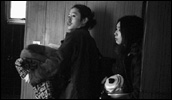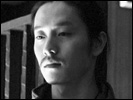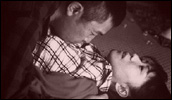Heart, Beating in the Dark – New Version
- Year
- 2005
- Original title
- Yamiutsu Shinzo
- Japanese title
- 闇打つ心臓
- Director
- Cast
- Running time
- 104 minutes
- Published
- 23 June 2006



by Tom Mes
Why Shunichi Nagasaki has never known wider international acclaim is at once a mystery and perfectly understandable. In his ability to probe the darkest recesses of our most human hearts, he is the equal of any filmmaker - perhaps even any artist - active today. So good is he, in fact, that he makes it seem stupendously easy to deliver the kind of insights he does: one is never shocked when coming out of a Nagasaki film, not because his films are uninteresting but because he doesn't need to underline his point. As a chronicler of the most painful side effects of human relationships he is in no way inferior to an Alejandro Gonzales Inarritu and certainly superior to a Paul Thomas Anderson. But since his films are rarely three hours in length, don't feature dogfights, tattooed criminals, and sobbing superstars, and aren't told as cleverly interweaving, multi-vignetted, Altman-esque narratives, he goes unnoticed by the international film establishment.
Though he regularly dabbles in genre - he has horror, film noir, and biker movies to his name - Nagasaki has also never been embraced in cult film circles, ironically for the very same reason: he treats genre with the same laidback virtuosity as the drama. When lined up alongside such colleagues as Kiyoshi Kurosawa, Takashi Miike, and Sogo Ishii, in the eyes of a programmer for a fantastic film festival or a DVD distributor relying on shocks and flash as marketing tools, Nagasaki will seem too subdued, too reluctant to wholeheartedly embrace genre. To them he will seem neither fish nor flesh. But if the film world were to apply the kind of criteria that culinary critics employ, Nagasaki would have long been in the three-star category, praised for the rare and subtle refinement of his cooking.
Heart, Beating in the Dark - New Version is unlikely to bring any change to the situation. It is the most challenging film to come out of Japan this year. Too challenging perhaps for any red carpet event (though much respect goes to the Rotterdam Film Festival, which had the balls to show it to a crowd of tuxedoed businessmen during its gala opening in early 2006, the year it paid tribute to the director with a thirteen-film retrospective). It is also not a genre film, even though it plays with motifs of ghosts and parallel dimensions. What haunt its four main characters are the deeds of the past and the prospects of the future. Indeed, the entire film is imprinted with these contemplations, which occupy the writer/director as much as his characters.
Let's step back twenty-five years in time. After a prolonged, even protracted, stay in hospital as a result of a serious accident on the set of his biker film The Lonely Hearts Club Band in September, Shunichi Nagasaki returns to filmmaking a changed man. Abandoning his old attempts at imitating the action films of the 1960 and 70s that influenced his choice of career, he makes a series of quickly made medium-length films in which he reflects on his position as a filmmaker who has outgrown a kind of cinematic adolescence and who realises he has no option but to move forward into an uncertain maturity. The main creation of this period - before returning to, and drastically transforming, his unfinished biker movie - is a 75-minute film shot on 8mm, about a couple that take it on the lam after the murdering their child. Considered by some as one of the best Japanese films of its decade, Heart, Beating in the Dark (1982) is brooding, sweaty, claustrophobic, and experimental, its protagonists' predicament a reflection of the insecurities about the future that its director was then feeling. Along with Lonely Hearts Club, it witnessed the definitive arrival of one of the main voices of the 8mm movement that transformed Japanese cinema in the late 70s / early 80s. As such, yes, it is without doubt among the most important films of its decade.
This new version is neither a remake nor a sequel. It is both those things, and at the same time it is also a documentary, a portrait of the consequences of passing time, and an occasionally very funny reflection on what the hell the point is of all this filmmaking business anyway. Shigeru Muroi and Takashi Naito, back then young hopefuls willing to take chances, now among the most established and recognisable actors in Japan, return to play the roles they assumed in the 1982 film, each of their characters having gone their own way. Alongside, another young couple (Honda and the ever-brilliant Eguchi) find themselves in the exact same situation as their older counterparts 25 years earlier. Their paths cross, an opportunity arises: for the elder two to redeem part of their own lives, for the younger couple to find a helping hand in their darkest hour.
Though it sounds like a straightforward enough story, Nagasaki also seizes his opportunity. To deconstruct, to look back, to contemplate. The result is not flashy, not headline-grabbing. But its audacity is unmatched. Its greatness perhaps also.